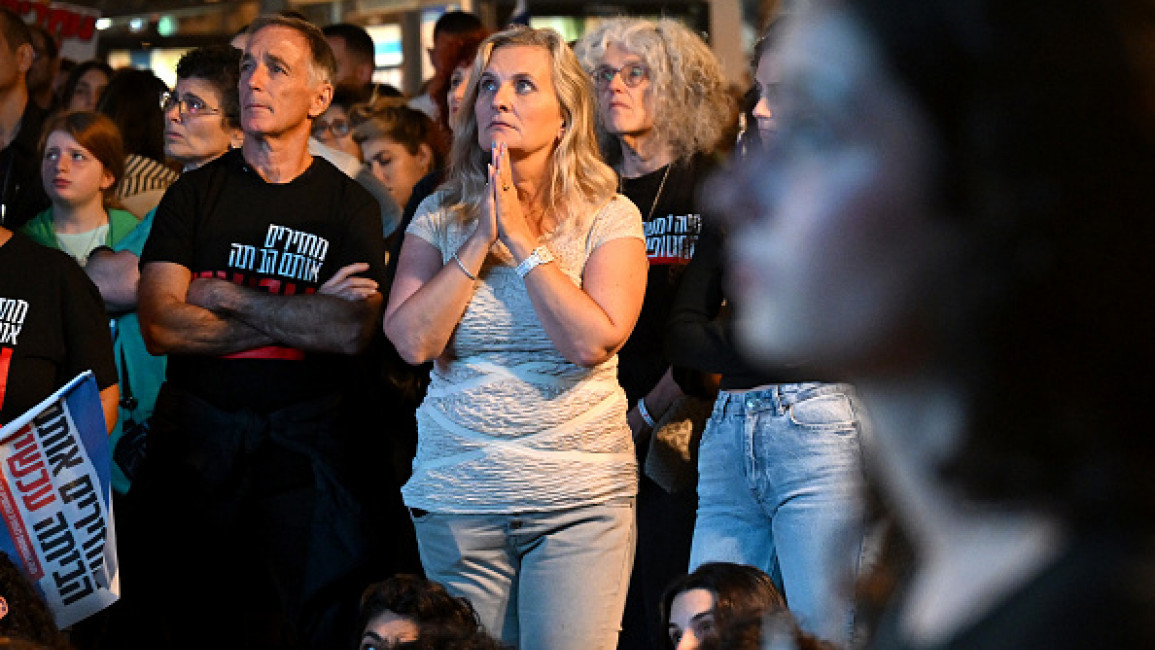Released hostages forced into media silence as Israel tightens control on interviews
The hostages freed by Hamas on Friday as part of the temporary truce deal are yet to speak to media outlets - whether Israeli or international - as the Israeli government maintains close supervision on their media appearances.
The Israeli authorities are expected to closely monitor the interviews released hostages to the press by briefing them on what should and should not be said about their kidnapping ordeal according to Israeli media, following what was described as a "PR disaster" for Israel when 85-year-old captive Yochaved Lifshitz said she was treated "gently" by her captors in October.
So far, only some family members of the 24 released hostages spoke publicly, which stands in contrast to the 39 Palestinian prisoners who were immediately interviewed by Palestinian and Arabic language media outlets upon their release.
As many as 150 Palestinians were expected to be released from Israeli jails in exchange for around 50 hostages taken captive by Hamas on October 7, as part of the carefully brokered truce deal which saw a pause in the fighting for the first time since the conflict began.
Palestinians released from prison reunite with loved ones.
— Al Jazeera English (@AJEnglish) November 24, 2023
— in pictures https://t.co/wrYii3z3Cd pic.twitter.com/tCdnqz3HhI
A family member of Ruth Munder, an elderly woman who was released on Friday, told the Israeli daily Jerusalem Post that Munder did not experience any harm during her captivity. "They were treated in a humane manner," the family member said.
"They described the initial moments of their kidnapping when [Hamas fighters] were agitated and threatened to harm them, but once they were on motorcycles, they did not harm them."
After 85-year-old captive Yochaved Lifshitz, who was released in October, told the media she was treated "with care" and was filmed shaking hands in a peace gesture with a Hamas soldier, the Israeli authorities have been eager to regain the narrative.
Lifshitz told the press how she received daily visits from a doctor during her captivity, and that they ate the same food as the guards. Lifshitz’s daughter also said that her mother was cared for by a paramedic during her captivity.
Another major blow to “israel’s” propaganda machine
— Husam Kaid (@Husam_Khaled1) October 24, 2023
Sharon Lifshitz, daughter of the released elder who shook the hands of her Hamas captors during the hand off, Yochaved Lifshitz
“My mom is saying that they were very friendly toward them”
ON BBC! IN PLAIN ENGLISH! #Gaza pic.twitter.com/khYqvWSclg
A report from Israeli news channel Channel 12 noted that Israeli authorities had arranged a special media process for the hostages’ post-release, in order to ensure they remain in control of the narrative.
It said that medical officials will first assess whether the released hostages were fit enough to be questioned about their ordeal by Israel’s national security branch, Shin Bet. The children who were taken hostage will also undergo questioning by special child investigators.
Crucially, the Channel 12 report noted that Israeli authorities had sought to control the narrative following criticism by Israeli commentators for what they said was a careless handling of Lifshitz’s press conference.
It said media interviews will not be banned for abductees, but closely supervised.
"Despite the anger after Yochaved Lifshitz's press conference upon her release, this time too there will be no ban on media interviews of the abductees," the report said.
"However, they are expected to receive close supervision, and they will be instructed on what to tell the media and what not."
A further 13 hostages were expected to be released on Saturday afternoon, but a late statement from Hamas said the handover would be delayed until Israel abides by the terms of the agreement – in particular over access for aid trucks to enter northern Gaza where the Israeli military is stationed.


![President Pezeshkian has denounced Israel's attacks on Lebanon [Getty]](/sites/default/files/styles/image_684x385/public/2173482924.jpeg?h=a5f2f23a&itok=q3evVtko)



 Follow the Middle East's top stories in English at The New Arab on Google News
Follow the Middle East's top stories in English at The New Arab on Google News


